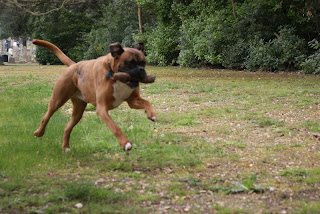Patrick Photography GCSE
Hello and welcome to my GCSE blog where I had to produce a project from the starting point - 'Animals in Motion' - take a look around! :)
Wednesday, 13 February 2013
Wednesday, 27 June 2012
Final experiment-A dog's perspective
When I had this idea, I knew that I would use it for my final outcome if I could get it to work properly, which was really difficult. I don't think anyone has ever tied a camera to a dog and then filmed it from their viewpoint, so I tried to do exactly that. Here is the first video that I made using this experiment.
I did encounter a lot of problems when I started filming, the first was that the camera was wobbling so much that I had to keep repositioning it and the film was terrible because everything was blurred and Bongo's head kept getting in the way, I overcame this by using more strings and positioning the camera so that it didn't wobble. Another problem I had was that the lens of the camera kept getting really dirty because Bongo kept sniffing in the plants and trees so I had to position the camera differently so that the camera wouldn't be as near to the plants etc. Because the camera moved a lot, it meant that the sounds recorded were of the camera moving and hitting Bongo's collar, this made the film sound bad and had a big effect meaning I had to edit out the noise and replace it with the tune, this also made the film more entertaining.
I am very happy with the end product because I thought it was very interesting to see what a dog sees and how different it is for us. Also because I don't think anyone has done this before and so it is original and unique. Another good thing was that the film camera only moved when and where bongo moved and so there wasn't too much running except for when he was running. Another thing I like is that the audience can easily tell what Bongo is doing by watching the film, for example, when the camera points to the ground, Bongo is sniffing, when the camera is a bit wobbly, Bongo is running etc.
Tuesday, 29 May 2012
Experiment-Movement in Dogs
In this experiment I wanted to see the science behind the movement in dogs so I took loads of photos of Bongo doing different movements and then I would study the way that he uses his joints and legs to produce that movement and at what speed he did it in.
In these photos, you can easily see how a dog runs because it shows different stages of a dog's movements. I found this interesting to know becuase it shows how a dog's limbs move to make the dog run at their full capacity and how they are used to stop aswell. I think it is appealing to people because when watching a dog, you don't know how it stops or runs etc. but in still images this is made possible. This experimant has taught me how to follow a dog's movement which will be harder to do when I am filming and so it was an important experiment for the final outcome.
Wednesday, 2 May 2012
Experiment-Animations
My next experiment was to get a series of photos of Bongo running and then make it into a small animation. To get these photos, I made Bongo wait until I was ahead of him, then I would make him run in front of me so that I could get a series of photos.
A problem that I had whilst doing this animation was the sun. Because Bongo wouldn't sit still for long, I didn't have a lot of time to sort out my settings on my camera which meant that these photos were too bright. To solve this I sorted out my camera settings before I took any photos.
A problem that I had whilst doing this animation was the sun. Because Bongo wouldn't sit still for long, I didn't have a lot of time to sort out my settings on my camera which meant that these photos were too bright. To solve this I sorted out my camera settings before I took any photos.
With this animation, the background was slightly different each time and so I had to photoshop the background each time to make it look the same.
Another problem that I had was that my drive mode isn't very fast so I would get big gaps in the series of photos. I thought this was bad whilst I was taking the photos, however, in the series below, there is an equal gap between each photo. This meant that Bongo was in the same position in each photo which I think is good because it shows a dog's positioning when they run and it is continuous.
To extend my animation idea, I tried to get Bongo running towards the camera so that he would get closer as the series went on.
This got me thinking that I could put these photos in a small animation where the last picture got replaced by the next one in the series.
I found this experiment extremely helpful becuase I caught some good series photos but also individual photos becuase I could take a pick of which moment I wanted to be an individual photo. This was also good becuase it taught me a lot about the movement of dogs which is my next experiment and led to my final outcome. I t also made my decision to make a film definite.
Subscribe to:
Comments (Atom)






























































